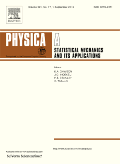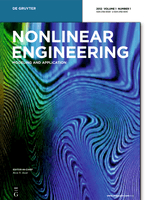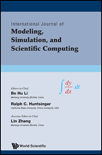
Complex Systems
Scope & Guideline
Connecting Theories and Technologies in Complex Systems
Introduction
Aims and Scopes
- Network Theory and Analysis:
The journal focuses heavily on the exploration of complex networks, including their structural properties, dynamics, and the influence of network topology on system behavior. - Agent-Based Modeling:
A significant portion of the research employs agent-based modeling techniques to simulate interactions within complex systems, allowing for insights into emergent phenomena and system-level behavior. - Interdisciplinary Applications:
Research published in the journal often bridges multiple disciplines, applying complex systems theory to fields such as economics, sociology, biology, and computer science. - Human Behavior and Social Dynamics:
The journal emphasizes the study of human behaviors within complex systems, particularly how social dynamics and interactions shape collective outcomes. - Mathematical and Computational Methods:
The use of advanced mathematical frameworks and computational algorithms is central to the research methodologies, enabling rigorous analysis of complex systems.
Trending and Emerging
- Machine Learning and AI in Complex Systems:
There is an increasing focus on the application of machine learning technologies to analyze and model complex systems, particularly in humanitarian contexts and for enhancing system resilience. - Sociotechnical Systems and Memory Mechanisms:
Recent research emphasizes understanding memory mechanisms within socio-technical systems, indicating a growing interest in how human and technological elements interact and influence each other. - Epidemic Modeling and Public Health:
Given the recent global health challenges, there is a notable trend towards modeling epidemic spread and public health dynamics, showcasing the relevance of complex systems in addressing real-world issues. - Cultural Complexity and Social Networks:
Emerging themes include the analysis of cultural complexity and its interplay with social networks, reflecting a broader interest in how cultural factors shape complex interactions. - Data-Driven Insights into Human Behavior:
There is a marked increase in studies utilizing large datasets to extract insights into human behaviors, particularly in relation to social dynamics and network interactions.
Declining or Waning
- Traditional Economic Models:
There has been a noticeable decrease in the publication of papers focused on traditional economic theories, possibly as researchers pivot towards more complex, agent-based, or network-centric approaches. - Static Network Analysis:
Research centered on static network analysis appears to be waning, as more recent studies emphasize dynamic and evolving network structures, reflecting a broader trend towards understanding systems in flux. - Classic Game Theory Applications:
Papers employing classical game theory without the integration of complex systems perspectives have become less frequent, suggesting a shift towards more nuanced, interdisciplinary approaches. - Single-Focus Behavioral Studies:
Studies concentrating solely on isolated behavioral phenomena, without contextualizing them within broader complex systems frameworks, are appearing less often, indicating a preference for integrative research.
Similar Journals

Journal of Physics-Complexity
Fostering Interdisciplinary Insights in Physics and Information ScienceThe Journal of Physics-Complexity, published by IOP Publishing Ltd, is a premier open access journal that has been making significant strides in the fields of Artificial Intelligence, Computer Networks and Communications, Computer Science Applications, and Information Systems since its establishment in 2020. Operating from the United Kingdom, this journal aims to foster interdisciplinary research that bridges theoretical and applied aspects of complexity science. With an admirable Q2 ranking in four prestigious categories and a Scopus ranking indicating it holds a solid position within its fields, this journal caters to a diverse audience of researchers, professionals, and students eager to explore the intricacies of complex systems. Its open access model ensures that groundbreaking research is readily available to the global community, thereby enhancing the dissemination of knowledge and information. As it converges towards 2024, the Journal of Physics-Complexity is poised to expand its influence, inviting innovative contributions that challenge conventional thinking and push the boundaries of scientific discovery.

JOURNAL OF STATISTICAL MECHANICS-THEORY AND EXPERIMENT
Connecting Theoretical Foundations with Experimental ExcellenceJOURNAL OF STATISTICAL MECHANICS-THEORY AND EXPERIMENT is a prominent academic journal published by IOP Publishing Ltd in the United Kingdom, focusing on the interdisciplinary realms of statistical mechanics and its applications across both theory and experimental research. Since its inception in 2004, the journal has consistently served as a crucial platform for researchers and professionals in statistical and nonlinear physics, as well as statistics and probability. With its strong Scopus ranking in the 87th percentile for Mathematics and 78th percentile in Physics and Astronomy, JOURNAL OF STATISTICAL MECHANICS provides high-impact content that promotes innovative research and the latest advancements in the field. Although currently not an open-access journal, it supports a wide readership through its strategic focus on rigorous peer-reviewed studies. Researchers, professionals, and students pursuing excellence in statistical mechanics will find this journal an invaluable resource for the dissemination of impactful findings and theoretical explorations.

Journal of Systems Science & Complexity
Connecting Disciplines to Illuminate Complex Systems.The Journal of Systems Science & Complexity, published by SPRINGER HEIDELBERG, stands as a leading forum for innovative research in the fields of computer science and information systems. With an ISSN of 1009-6124 and an E-ISSN of 1559-7067, this journal has established itself within the academic community, garnering a commendable impact factor that reflects its influential contributions. Operating from 2006 and continuing through 2024, it is categorized in the Q2 quartile for both Computer Science (Miscellaneous) and Information Systems, indicating its quality and relevance. Recognized within Scopus rankings, it places 52nd out of 133 in its specific field, affirming its significance in advancing systems science discussions. Researchers and professionals will find a wealth of knowledge through rigorous peer-reviewed articles that explore complex systems and their applications, enabling readers to stay at the forefront of technological advancements and interdisciplinary collaboration.

PHYSICA A-STATISTICAL MECHANICS AND ITS APPLICATIONS
Elevating Research Standards in Statistical and Nonlinear Physics.PHYSICA A-STATISTICAL MECHANICS AND ITS APPLICATIONS, published by Elsevier, is a prestigious journal that has been at the forefront of statistical mechanics, condensed matter physics, and applications thereof since its inception in 1975. With an ISSN of 0378-4371 and an E-ISSN of 1873-2119, this journal serves as a critical platform for researchers, professionals, and students who seek to explore the intricate interplay between statistical theories and real-world applications. PHYSICA A boasts an impressive impact factor and has consistently maintained a strong academic standing, ranking in the Q2 quartile in several categories, including Condensed Matter Physics and Statistical and Nonlinear Physics, based on the latest 2023 Scopus rankings. Researchers can access high-quality, peer-reviewed articles that contribute to the advancement of knowledge in the field while addressing complex challenges in statistics and probability. For those engaged in the evolving landscape of physics, this journal offers indispensable insights and a robust collection of influential research, affirming its importance as a cornerstone of reference material in statistical mechanics.

Physics of Life Reviews
Illuminating the Synergy Between Physics and Life SciencesPhysics of Life Reviews is an esteemed journal published by ELSEVIER, focusing on the interdisciplinary study of life sciences through the lens of physical principles. Since its inception in 2004, the journal has garnered considerable recognition, achieving a remarkable impact factor that underscores its significance—ranking in the top quartile (Q1) across three distinct categories in 2023, including Agricultural and Biological Sciences, Artificial Intelligence, and Physics and Astronomy. These exceptional rankings highlight the journal's commitment to advancing research and fostering innovation in the application of physical concepts to biological systems. Physics of Life Reviews provides comprehensive reviews, critical analyses, and cutting-edge insights that are essential for researchers, professionals, and students seeking to navigate and contribute to this dynamic field. As an essential resource, the journal encourages the exploration of new paradigms and methodologies, facilitating the growth of knowledge at the intersection of physics and life sciences.

Nonlinear Engineering - Modeling and Application
Connecting Theory and Application in Nonlinear EngineeringNonlinear Engineering - Modeling and Application is a premier journal dedicated to advancing the fields of engineering, modeling, and simulation, published by De Gruyter Poland Sp. z o.o. since 2012. With an impressive impact factor reflected in its prestigious rankings—Q2 in Chemical Engineering and Miscellaneous Engineering and Q3 in Computer Networks and Communications—this journal serves as an invaluable resource for researchers and practitioners seeking to explore the intricacies of nonlinear systems and their applications. As an Open Access journal since 2019, it ensures that groundbreaking research is readily available to the global community, fostering collaboration and innovation. Situated at the forefront of its field, Nonlinear Engineering provides high-quality, peer-reviewed articles that contribute to understanding complex phenomena in various engineering disciplines, making it an essential publication for those eager to stay on the cutting edge of technology and research.

International Journal of Modeling Simulation and Scientific Computing
Exploring New Dimensions in Computational ScienceThe International Journal of Modeling Simulation and Scientific Computing, published by WORLD SCIENTIFIC PUBL CO PTE LTD, is a pivotal resource in the realms of Computer Science Applications and Modeling and Simulation. With an ISSN of 1793-9623 and an E-ISSN of 1793-9615, this journal serves as a platform for innovative and high-quality research from 2010 to 2024, contributing to the advancement of methodologies and applications in various scientific fields. Although currently categorized in the Q4 quartile for both recognized domains and positioned in the 42nd and 36th percentiles in the Scopus rankings for Mathematics and Computer Science respectively, the journal encourages scholarly exchange and fosters the integration of modeling and computational analysis in scientific research. Researchers, professionals, and students alike will find this journal an essential tool to stay updated with trends, methodologies, and cutting-edge findings in simulation and computational techniques that drive scientific inquiry today.

BIOLOGICAL CYBERNETICS
Pioneering Research in Biological CyberneticsBIOLOGICAL CYBERNETICS is a premier journal published by SPRINGER, dedicated to advancing the fields of biotechnology and computer science through the lens of biological interactions. With an ISSN of 0340-1200 and an E-ISSN of 1432-0770, this esteemed journal has been a cornerstone of academic research since its inception in 1961 and is set to continue influencing the landscape of biological cybernetics through 2024. The journal currently holds a Q3 ranking in the Biotechnology category and a Q2 ranking in miscellaneous Computer Science according to the 2023 category quartiles, showcasing its credibility and impact in the interdisciplinary nexus of these fields. Although it does not provide open access options, researchers and students can engage with its innovative content that includes original research articles, reviews, and methodologies that explore the computational modeling of biological systems and the integration of artificial intelligence in biological research. With its strategic location in the United States and a robust publication record, BIOLOGICAL CYBERNETICS remains an essential resource for anyone looking to deepen their understanding and application of cybernetic principles within biological contexts.

Nonlinear Phenomena in Complex Systems
Connecting Researchers in Nonlinear DynamicsNonlinear Phenomena in Complex Systems, published by BELARUSSIAN STATE UNIV, JOINT INST POWER & NUCLEAR RESEARCH, is an emerging platform dedicated to advancing the understanding of nonlinear phenomena within complex systems. With an ISSN of 1561-4085 and an E-ISSN of 1817-2458, this journal serves as a vital resource for researchers spanning the fields of mathematical physics and statistical and nonlinear physics. While classified within the Q4 quartile for both disciplines as of 2023, we encourage authors to submit impactful research that addresses the intricacies and challenges presented by complex systems, which are pivotal in various scientific applications. Targeting an international audience, including researchers, professionals, and students, the journal aspires to foster collaboration and innovation by offering open access to its insightful articles. With a converged publication timeline from 2009 to 2024, Nonlinear Phenomena in Complex Systems is poised to become a significant contributor to the evolving dialogue around nonlinear dynamics and their implications across multiple scientific domains.

Journal of Mathematics Mechanics and Computer Science
Fostering collaboration in mathematics, mechanics, and computing.Journal of Mathematics Mechanics and Computer Science is a pioneering open access journal published by AL-FARABI KAZAKH NATL UNIV, dedicated to advancing the field of mathematics and its applications in mechanics and computer science. Established in 2009, this journal aims to provide a platform for innovative research, encouraging the dissemination of high-quality, peer-reviewed articles that push the boundaries of mathematical theory and computational methods. Though the journal currently ranks within the lower quartiles in Scopus categories, it remains committed to fostering academic discourse and advancing knowledge in its scope areas. Located in Almaty, Kazakhstan, the journal also emphasizes accessibility, ensuring that all research is readily available to researchers, professionals, and students worldwide. With a focus on developing new theoretical frameworks and practical applications, the Journal of Mathematics Mechanics and Computer Science is an essential resource for those aiming to engage with cutting-edge developments in mathematics and computer science.